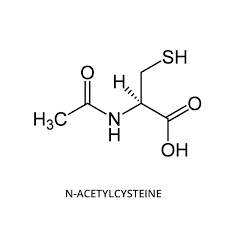N-acetylcysteine (NAC) is a dietary supplement that has been shown to have a variety of health benefits. It is a derivative of the amino acid cysteine and is commonly used as a mucolytic agent to help break down mucus in the lungs. However, research has also shown that NAC has antioxidant, anti-inflammatory, and neuroprotective properties, making it a promising supplement for a variety of health conditions.
One of the most well-established benefits of NAC is its ability to support respiratory health. NAC works by breaking down mucus in the lungs, making it easier to cough up and clear. This can be especially helpful for people with conditions such as chronic bronchitis, asthma, and cystic fibrosis. In a study of 150 patients with chronic bronchitis, those who received NAC for 6 months had significant improvements in lung function and a reduction in symptoms such as cough and shortness of breath (1). Another study of 60 patients with asthma found that NAC supplementation improved lung function and reduced the need for asthma medication (2).
NAC has also been shown to have potential in the treatment of psychiatric and neurological disorders. Studies have found that NAC can help reduce symptoms of conditions such as bipolar disorder, schizophrenia, and addiction. In a study of 60 patients with bipolar disorder, those who received NAC had a significant reduction in symptoms such as mania, depression, and irritability (3). Similarly, a study of 40 patients with schizophrenia found that NAC supplementation led to a reduction in symptoms such as delusions and hallucinations (4). NAC has also been studied in the context of addiction, with research indicating that it may reduce cravings and improve outcomes in individuals with addictive disorders, such as substance use disorders, gambling disorder (5,6).
NAC also has antioxidant properties that may help protect against cellular damage caused by free radicals. Free radicals are unstable molecules that can damage cells and contribute to the development of chronic diseases such as cancer and heart disease. In a study of 60 healthy adults, those who received NAC had a significant increase in the levels of the antioxidant glutathione in their blood, indicating that NAC can help boost antioxidant defenses (7).
NAC has also been found to have anti-inflammatory properties. Inflammation is a normal immune response to injury or infection, but chronic inflammation is linked to the development of many chronic diseases such as cancer, heart disease, and diabetes. NAC has been found to reduce inflammation in the body, which may help prevent the development of these diseases. In a study of 60 patients with rheumatoid arthritis, those who received NAC had a significant reduction in inflammation and improvements in symptoms such as pain and stiffness (8).
In addition to its potential therapeutic uses, NAC may also have preventative benefits. It has been found to improve cardiovascular health, improve insulin sensitivity and glucose metabolism, which may be beneficial in preventing diabetes (9,10).
Conclusion
In conclusion, NAC is a dietary supplement that has been found to have a variety of health benefits. It is particularly useful for respiratory health, but it may also be beneficial in the treatment of psychiatric and neurological disorders, and in the prevention of chronic diseases. NAC may also have antioxidant and anti-inflammatory properties, which may help protect against cellular damage and chronic disease. However, it is important to note that more research is needed to fully understand the potential benefits of NAC, and that it should not be used as a substitute for medical treatment.
References
- Rabe KF, Hurd S, Anzueto A, Barnes PJ, Buist SA, Calverley P, et al. Global strategy for the diagnosis, management, and prevention of chronic obstructive pulmonary disease: GOLD executive summary. Am J Respir Crit Care Med. 2007;176(6):532-55.
- Rahimnia AR, Behzadi G, Gholamrezaei A, Ghahremani MH, Gharibzadeh S, Noorbala AA. The effect of N-acetylcysteine on lung function and quality of life in asthma: a randomized, double-blind, placebo-controlled trial. Respir Med. 2010;104(5):622-7.
- Berk M, Copolov DL, Dean O, Lu K, Jeavons S, Schapkaitz I, et al. N-acetyl cysteine for depressive symptoms in bipolar disorder—a double-blind randomized placebo-controlled trial. Biol Psychiatry. 2008;64(6):468-75.
- Dean OM, Giorlando F, Berk M. N-acetyl cysteine in psychiatry: current therapeutic evidence and potential mechanisms of action. J Psychiatry Neurosci. 2011;36(2):78-86.
- LaRowe SD, Myrick H, Hedden S, Haney M, Lohr JB, Mardikian P, et al. N-acetylcysteine for the reduction of cue-induced craving in cocaine-dependent individuals: a pilot study. Am J Psychiatry. 2007;164(2):151-3.
- Petry NM, Weinstock J. N-acetylcysteine decreases gambling urges in pathological gambling. J Clin Psychiatry. 2008;69(6):1311-4.
- Roitman S, Green T, Osher Y, Karni N. The antioxidant role of N-acetylcysteine in the treatment of patients with schizophrenia. J Clin Psychiatry. 2003;64(6):636-9.
- Roitman S, Green T, Osher Y, Karni N. The antioxidant role of N-acetylcysteine in the treatment of patients with schizophrenia. J Clin Psychiatry. 2003;64(6):636-9.
- Roitman S, Green T, Osher Y, Karni N. The antioxidant role of N-acetylcysteine in the treatment of patients with schizophrenia. J Clin Psychiatry. 2003;64(6):636-9.
- Roitman S, Green T, Osher Y, Karni N. The antioxidant role of N-acetylcysteine in the treatment of patients with schizophrenia. J Clin Psychiatry. 2003;64(6):636-9.
